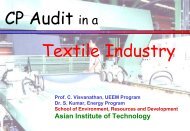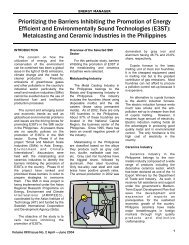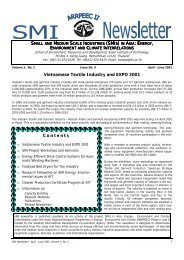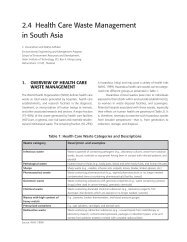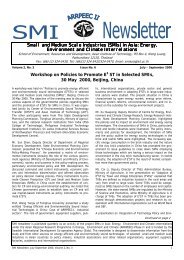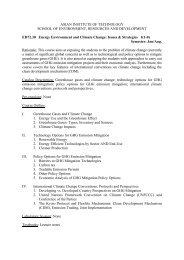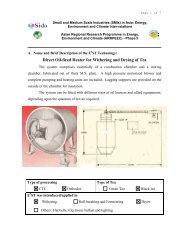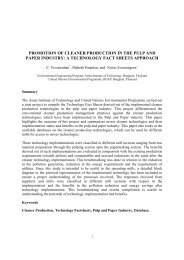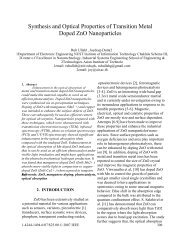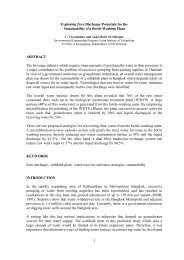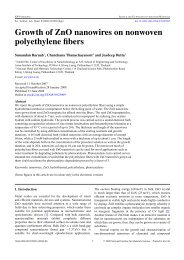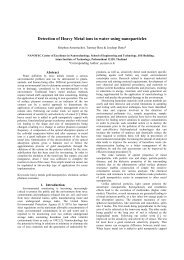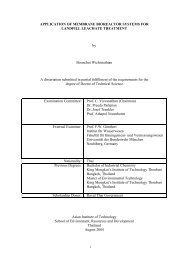A Gap Analysis in Selected Asian Countries, 3R Knowledge Hub ...
A Gap Analysis in Selected Asian Countries, 3R Knowledge Hub ...
A Gap Analysis in Selected Asian Countries, 3R Knowledge Hub ...
You also want an ePaper? Increase the reach of your titles
YUMPU automatically turns print PDFs into web optimized ePapers that Google loves.
• Weak <strong>in</strong>frastructure of disposal facilities and<br />
treatment technology and lack of expertise<br />
and understand<strong>in</strong>g of alternative treatment<br />
choices and a comprehensive waste<br />
management philosophy<br />
• Poor monitor<strong>in</strong>g of waste generation<br />
• Low quality of <strong>in</strong>c<strong>in</strong>eration equipment<br />
• Unsafe collect<strong>in</strong>g (and discharg<strong>in</strong>g) of<br />
developer/fixer<br />
• Poor management <strong>in</strong> the centralized<br />
treatment and disposal of <strong>in</strong>fectious articles<br />
To cope with healthcare waste <strong>in</strong> the future, it is<br />
imperative to establish a comprehensive<br />
management system. The current system has a<br />
strong focus on the f<strong>in</strong>al disposal of the medical<br />
waste only, neglect<strong>in</strong>g avoidance and<br />
utilization. Shanghai has already taken standard<br />
management measures on hazardous waste.<br />
However, its control on medical waste is just at<br />
the beg<strong>in</strong>n<strong>in</strong>g. Up to now, hospital waste is<br />
either handled by each s<strong>in</strong>gle hospital or<br />
centralized and handled by the Public Health<br />
Department or the Epidemic Prevention<br />
Department.<br />
E-WASTE<br />
Electronic waste provides another example of<br />
how Ch<strong>in</strong>a is be<strong>in</strong>g affected by global markets<br />
for recycled materials. In the US alone more<br />
than 40 million computers became obsolete <strong>in</strong><br />
2001, and as much as 80% of these were<br />
exported, mostly to Ch<strong>in</strong>a, at about a 10th of the<br />
price of recycl<strong>in</strong>g or disposal <strong>in</strong> the home<br />
country. Even today, tons of e-waste is imported<br />
<strong>in</strong> Ch<strong>in</strong>a. Currently, Ch<strong>in</strong>a is generat<strong>in</strong>g about<br />
two million tons of e-waste which comes from<br />
four ma<strong>in</strong> sources:<br />
• Waste electronic products from households<br />
• Waste electronic products from government<br />
<strong>in</strong>stitutions and enterprises<br />
• Defective electronic products from<br />
manufacturers<br />
• Imported electronic waste<br />
The Ch<strong>in</strong>a Household Electrical Appliances<br />
Association estimates that Ch<strong>in</strong>ese households<br />
and companies throw out 15 million<br />
refrigerators, 10 million air conditioners, 18<br />
million wash<strong>in</strong>g mach<strong>in</strong>es and 35 million<br />
computers every year. This data is based on an<br />
8-to-10-year product lifespan. With e-waste still<br />
be<strong>in</strong>g smuggled <strong>in</strong>to the ma<strong>in</strong>land, many<br />
scientists estimate that the country will be<br />
unable to cope with the amount of hazardous<br />
waste generated, which results <strong>in</strong> severe<br />
secondary pollution.<br />
F<strong>in</strong>d<strong>in</strong>gs<br />
The city of Guiyu, <strong>in</strong> the southern prov<strong>in</strong>ce of<br />
Guangdong, is the centre of an environmental<br />
disaster that has got out of control. Here and <strong>in</strong><br />
several nearby townships; electronic waste,<br />
mostly imported is broken up <strong>in</strong> small<br />
workshops. It is a version of outsourc<strong>in</strong>g that<br />
saves high cost of dispos<strong>in</strong>g of electronic trash<br />
and provides livelihood to many. In this part of<br />
Ch<strong>in</strong>a, recycl<strong>in</strong>g e-waste is apparently not<br />
subjected to any environmental, health, and<br />
safety regulations.<br />
In small workshops, yards and open<br />
countrysides, poor workers handle hazardous<br />
wastes result<strong>in</strong>g from affluent lifestyles. Armed<br />
mostly with small hand tools, they take apart<br />
old computers, monitors, pr<strong>in</strong>ters, video and<br />
DVD players, photocopy<strong>in</strong>g mach<strong>in</strong>es,<br />
telephones, mobile phones and chargers, music<br />
speakers, car batteries and microwave ovens.<br />
Ch<strong>in</strong>ese law forbids the importation of<br />
electronic waste and is a signatory to the Basel<br />
Agreement. E-waste imports have been so<br />
disorganized <strong>in</strong> Ch<strong>in</strong>a s<strong>in</strong>ce 1996, but the<br />
country, consider<strong>in</strong>g the latent benefits, has<br />
turned a bl<strong>in</strong>d eye.<br />
E-waste recycl<strong>in</strong>g – Guiyu town, Guandong<br />
Prov<strong>in</strong>ce, South Ch<strong>in</strong>a.<br />
Image source: Basel Action Network 2006<br />
Chapter 3: Country <strong>Analysis</strong><br />
45



